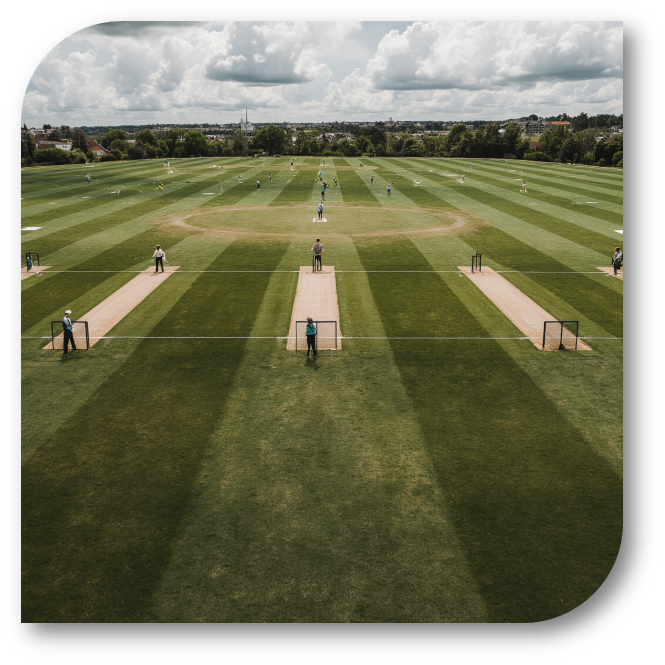Laws of Cricket
Cricket is currently played all over the world, with Australia, India, the West Indies, Pakistan, and the British Isles enjoying special prominence. Cricket was once exclusively played in England during the summer. A bat-and-ball game called cricket is played between two opposing sides (teams) of 11 players. The middle of the oval field is a rectangular pitch that is 22 yards by 10 feet. At either end of the field, there are two lines of three sticks apiece, known as wickets. Bails refers to the top horizontal elements of each wicket. As the sides rotate between bowling and batting, each turn is referred to as an “inning”.
Boys and girls may start playing cricket as early as age 5, and it’s a fun, sociable game that’s simple to master. Additionally, you’ll discover that most schools teach cricket as a component of physical education, and almost every town as well as the suburb has a team that participates in regional competitions. Therefore, cricket is an excellent option when choosing a sport for your kids to play to make friends, have fun, and stay active. To show some simple exercises that kids and their parents may do at home or on the playground to hone skills and improve their general play, we’ll go over some essential rules and laws in this post.
| Rank | Brand | Best Bonus Offer | Expert Review | Claim Bonus Now | |
|---|---|---|---|---|---|
| 1 |

|
Rajabets | Sports: 200% up to ₹1,00,000 / Casino: 200% up to ₹1,00,000 + 500 Aviator Free Spins | Read Review | |
| 2 |

|
Dafabet | Sports: 160% up to ₹16,000 (Bonus Code: DSFDB160INR) / Casino: 100% up to ₹20,000 | Read Review | |
| 3 |

|
Mostbet | Sports: 425% up to ₹1,48,000 + 440 Free Spins / Casino: 350% up to ₹1,48,000 + 445 Free Spins | Read Review | |
| 4 |

|
Tez888 | Sports & Casino: 500% up to ₹75,000 | Read Review | |
| 5 |

|
Parimatch | Sports: 150% up to ₹20,000 / Slots: 150% up to ₹1,05,000 / Aviator: 100% up to ₹30,000 | Read Review | |
| 6 |

|
Megapari | Sports: 200% up to ₹40,000 / Casino: Welcome Package up to ₹133,700 + 150 Free Spins | Read Review | |
| 7 |

|
Leon | Sports: Changing Bonuses / Casino: 370% up to ₹60,000 + 20 Free Spins | Read Review | |
| 8 |

|
Bettilt | Sports: 150% up to ₹25,000 / Casino: 150% up to ₹50,000 + 50 Free Spins | Read Review | |
| 9 |

|
BetWinner | Sports: 100% up to ₹8,000 / Welcome Package up to ₹127,000 + 150 Free Spins | Read Review | |
| 10 |

|
1xBet | Sports: 120% up to ₹33,000 / Casino: 300% up to ₹1,50,000 + 150 Free Spins | Read Review | |
| 11 |

|
10Cric | Sports & Casino: 150% up to ₹20,000 (Bonus Code: WELCOME150) + 10 Aviator Free Spins | Read Review | |
| 12 |

|
JeetKhel | Casino: 450% up to ₹35,000 | Read Review | |
| 13 |

|
20Bet | Sports: 100% up to €100 (₹10,500) / Casino: 100% up to €120 (₹12,600) | Read Review | |
| 14 |

|
4RaBet | Sports: 700% up to ₹20,000 / Casino: 700% up to ₹40,000 | Read Review | |
| 15 |

|
FTV Club | Sports: 100% up to ₹15,000 / Casino: 100% up to ₹20,000 + 20 Free Spins | Read Review | |
| 16 |

|
Crickex | Slots: 150% up to ₹1,000 / Changing Promotions & Deals | Read Review | |
| 17 |

|
9Winz | Casino: 450% up to ₹3,00,000 | Read Review | |
| 18 |

|
Fresh | Sports: 300% up to ₹20,000 / Casino: 175% up to ₹45,000 | Read Review | |
| 19 |

|
7Cric Neo | Sports: 30% up to ₹5,000 / Casino: 10% up to ₹10,000 | Read Review | |
| 20 |

|
Drip | Sports: 150% up to ₹10,000 / Casino: 150% up to ₹30,000 | Read Review | |
| 21 |

|
22Bet | Sports: 100% up to ₹10,300 / Casino: 200% up to ₹135,000 + 150 Free Spins | Read Review | |
| 22 |

|
Jet | Sports: 300% up to ₹20,000 / Casino: 175% up to ₹45,000 | Read Review |





